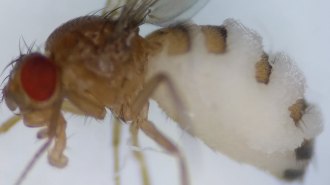All Stories
-
 Humans
HumansForget discrete droplets. This is how sweat really forms
The most-detailed look yet at how we perspire reveals that beads of sweat are out, puddling is in.
-
 Science & Society
Science & SocietyScreen addiction affects teens’ mental health. How to spot it, and help
Banning screens is often not an option. So Science News spoke with experts studying screen use and addiction in teens to help families navigate this complex issue.
By Sujata Gupta -
 Health & Medicine
Health & MedicineU.S. measles outbreaks may end a hard-won victory over the virus
Dropping vaccination rates and changes in U.S. vaccine policy have public health experts concerned that annual measles outbreaks could become more frequent.
-
 Astronomy
AstronomyBetelgeuse’s companion star revealed in new images
Revealed by advanced imaging, the long-sought "Betelbuddy" is much smaller and fainter than Betelgeuse and orbits within the supergiant’s atmosphere.
-
 Life
LifeThis killer fungus strikes at sunset. Here’s how
The fungus Entomophthora muscae turns flies into zombies and kills them at sunset. An internal kill clock may explain the mysterious timing.
By Meghan Rosen -
 Health & Medicine
Health & MedicineHere’s how air pollution may trigger lung cancer
Exposure to air pollution may trigger DNA mutations that cause lung cancer in nonsmokers.
By Meghan Rosen -

A summer of escalating existential threats
Editor in Chief Nancy Shute reflects on the renewed specter of nuclear conflict to record-breaking heat driven by human-caused climate change.
By Nancy Shute -

-
 Health & Medicine
Health & MedicineU.S. FDA may nix black box warning on some menopause estrogen treatments
Experts worry the warning on vaginal estrogen menopause treatments is doing more harm than good and is not supported by science.
-
 Humans
HumansA child’s biological sex may not always be a random 50-50 chance
Some people’s biology may set them up to birth babies of a certain sex, explaining why a family with multiple children may have all girls or all boys.
By Jake Buehler -
 Health & Medicine
Health & Medicine‘Rehab’ exposes the dark underside of U.S. drug treatment centers
In Rehab, journalist Shoshana Walter investigates the systemic pitfalls of drug treatment programs, which prevent people’s recovery from addiction.
By Meghan Rosen -

Math puzzle: Can you meet me at the mall?
Solve the math puzzle from our August 2025 issue, which takes you back to the time before cell phones.